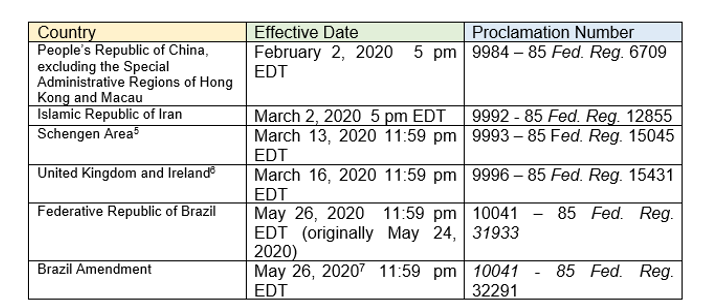For the last 4 years, U.S. immigration law and policy has been in the spotlight with numerous Presidential Proclamations, Executive Orders, and rapid policy changes as well as regulations, which have resulted in a long-lasting ripple effect on U.S. employers and its foreign workforce. These changes have resulted in numerous challenges in court through litigation. What can employers and foreign workers expect under the new Biden Administration starting in January 2021?
One of 2020’s biggest challenges faced by employers sponsoring foreign workers has been the immigrant and nonimmigrant presidential proclamations suspending visa processing at U.S. consular post abroad. Presidential Proclamation 10014 and 10052, “Suspending Entry of Immigrants and Nonimmigrants Who Present Risk to the U.S. Labor Market During the Economic Recovery Following the COVID-19 Outbreak,” resulted in an H-1B, H-2B, J-1, and L visa ban which remains in effect until December 31, 2020. See our blog post, Nonimmigrant and Immigrant Visa Processing Halted by Presidential Proclamation – Effective June 24 for Certain Nonimmigrants. As December 31 is fast approaching which is the date these proclamations expire, the million-dollar question is whether the Trump Administration will extend these proclamations or simply let them expire. Bets are on, and it could go either way, but if the proclamations are extended by President Trump, then we have to wait for action by President-Elect Biden. If extended, we anticipate that the proclamations will be rescinded after President-Elect Biden takes office in January 2021. The backlogs created by these proclamations will take consular officers many months to address even if rescinded early in the Biden Administration. For the proactive foreign worker, who has booked a visa appointment in early January, they should not expect the ongoing cancellations of appointments by consular posts to end due to staffing and backlog challenges.
Another proclamation based in both the employer and foreign traveler’s side has been the health-related travel restrictions issued through another round of Presidential Proclamations. See our blog post, ESTA Cancellation Risks and the Schengen Travel Presidential Proclamation.

As noted in the chart above, since March 13, 2020, travel has been suspended for foreign nationals physically present in a European Schengen Area country, for 14 days preceding their attempted entry into the U.S., with some exceptions. Foreign workers, who had to return to the U.S., were forced to take an expensive detour by traveling to another country without any travel restrictions to remain for 14 days, and then seek entry into the U.S. The alternative has been seeking a National Interest Exception (NIE) from the U.S. Embassy or Consulate abroad or from Customs and Border Protection (CBP) in limited cases. See our blog post, State Department Expands National Interest Exceptions for Nonimmigrants Subject to Presidential Proclamation 10052. However, satisfying the criteria has proven to be difficult resulting in foreign travelers waiting abroad for unpredictable periods. These health-related travel restriction proclamations do not have a set expiration date. However, this one is tricky and what happens next is not clear. COVID-19 numbers are increasing and stay-at-home orders are coming back. As such, it is possible that the health-related travel restrictions remain in place until COVID-19 vaccines are widely available to the public. On the other hand, while President Trump and President-Elect Biden have polar opposite views on immigration, President Trump could rescind this proclamation before leaving office to force President-Elect Biden to make a difficult political and health-related decision.
We do know that President-Elect Biden has signaled his intent to rescind the Muslim travel ban in his first 100 days in office.
With an immigration friendly Biden Administration, we expect a rapid reversal of many detrimental policies from a humanitarian perspective, such as the Trump Administration’s policy of separating immigrant children from their parents at the U.S./Mexican border. Changes as to increasing the numbers of work-based immigrant visas or reducing delays and bureaucratic hoops for STEM graduates, for example, will depend on congressional cooperation. The Georgia senate race will be a key issue to watch.
It will take time for changes to take effect, but employers should expect relief soon.
About the Author:
Suzanne Sukkar is a U.S. Business Immigration Attorney at the law firm of Dickinson Wright PLLC. Her practice focuses on global workforce mobility, employment-based sponsorship and visa matters, immigration audit and compliance for corporate and individual clients across a vast array of industries. Suzanne renders expert strategic and tactical counsel to a broad clientele base including visa matters for client’s employees at all levels of the corporate organizational structure, from the highest level executives, to the entry-level business professional, investors, extraordinary ability workers, outstanding researchers and professors, musicians, artists and athletes, and more. She developed a niche expertise in the area of E treaty trade and investor visas, consular processing, and start-up ventures. Through strategic planning and by offering creative solutions, she has assisted with the seamless transfer of numerous workers worldwide. She may be reached in our Ann Arbor office at 734.623.1694. Visit Suzanne’s bio here.

